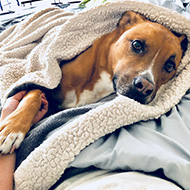App to help owners monitor congestive heart failure in their pets

"Having a means of remote monitoring is more important than ever."
A new at-home tool to help pet owners monitor congestive heart failure in their pets has been developed by pharmaceutical firm, Vetoquinol.
The free web-based app and digital tracker enables pet owners to monitor their pet's sleeping respiratory rate (SRR) and indicates the status of their medical condition.
The app also generates data that can be shared remotely with veterinary teams, something that may be particularly useful during the COVID-19 lockdown when practices are trying to minimise face-to-face contact with clients.
"Being able to monitor patients with congestive heart failure is important at any time but during lockdown, with some routine checks having to be postponed, having a means of remote monitoring is more important than ever,” explained Helen Hunter, product manager at Vetoquinol.
“This tool will help veterinary professionals make the judgement call about whether the pet needs to be seen, especially when the results are provided in the context monitoring that has taken place over time, providing an assessment of what is normal for that patient."
The app is one of several free resources available to veterinary surgeons available at www.uplife.uk. The resource includes various webinars, diagnostic aids and case challenges.
To complement the addition of the new app, the site also contains a webinar delivered by RCVS Recognised Specialist in Cardiology, Dave Dickson. The presentation discusses the ‘10 Golden Rules of Congestive Heart Failure' and covers topics including the importance of clear radiography and why a cough is not diagnostic of CHF.
Commenting on the new app, Mr Dickson said: “Sleeping respiratory rate is one of the most useful ways to monitor an animal in CHF or to look for signs of CHF developing.
“By encouraging pet owners to monitor and track the dog's sleeping respiratory rate at home, owners can provide vets with a valuable insight into the success of the current treatment regime.”



 The Veterinary Medicines Directorate (VMD) is inviting applications from veterinary students to attend a one-week extramural studies (EMS) placement in July 2026.
The Veterinary Medicines Directorate (VMD) is inviting applications from veterinary students to attend a one-week extramural studies (EMS) placement in July 2026.